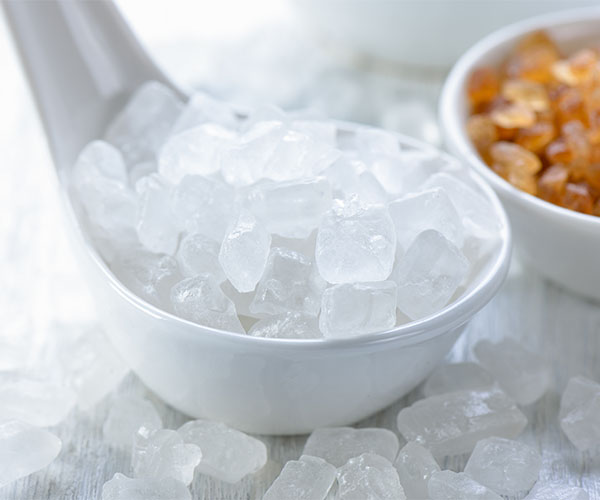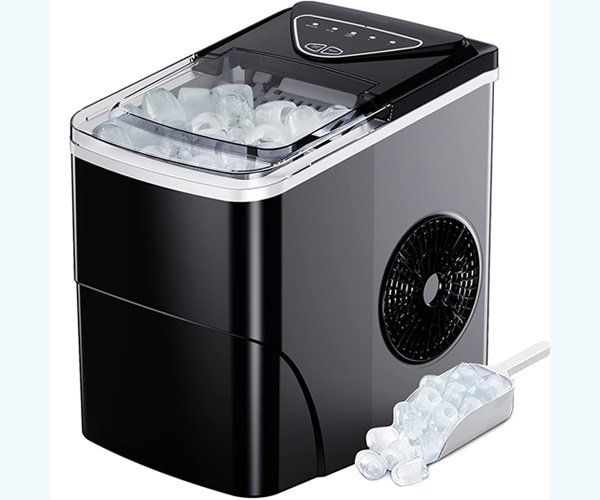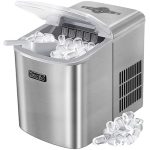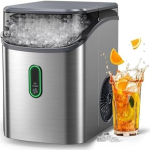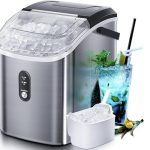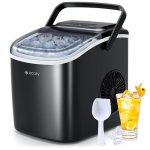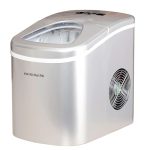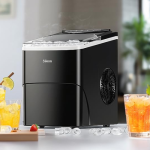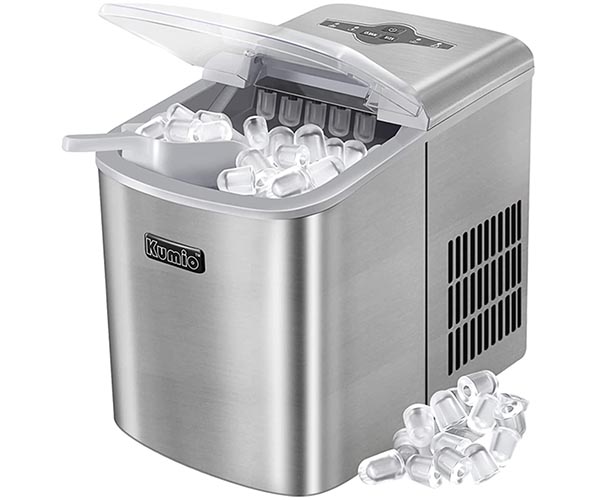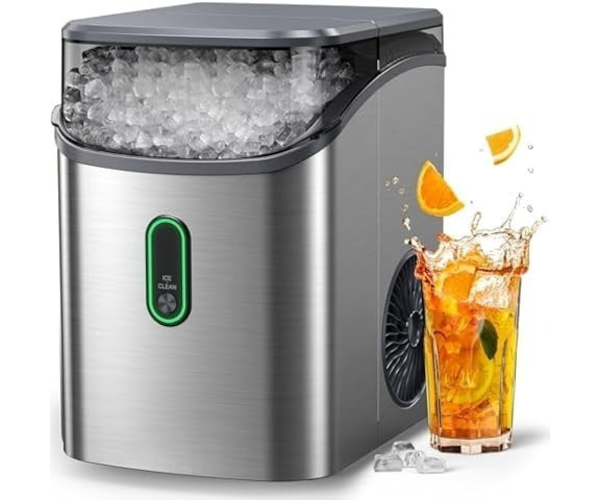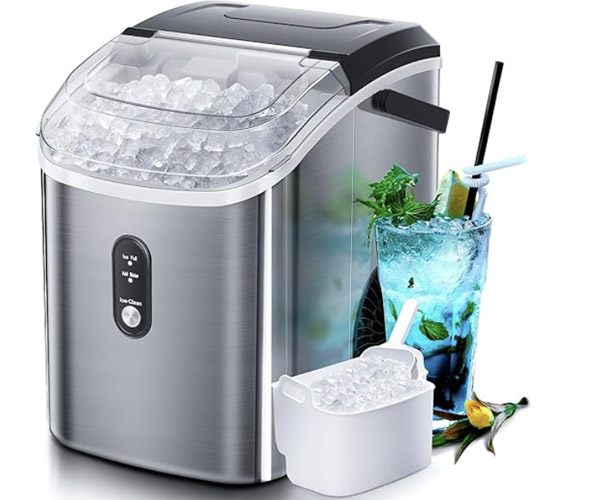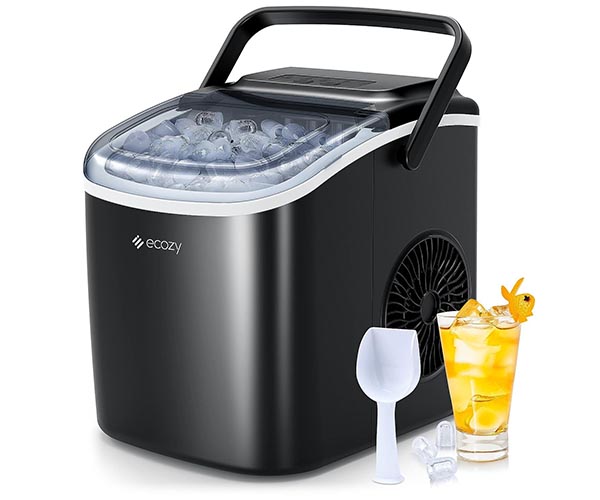Introduction
Imagine that you are getting ready for a large family gathering and that you are imagining a day full with laughing and the sound of glasses being clinked. However, as you are getting ready, you become aware of a disturbing sound coming from your kitchen. It is your ice machine, which is humming away the entire time but is unable to generate even a single cube. This situation is not only annoying, but it also serves as a straightforward indication that there is a problem with a home necessity that many people take for granted. We dig into the perplexing circumstance in which your ice machine is noisy but continues to be unproductive in this piece to shed light on the matter. In this article, we will investigate the inner workings of ice machines, identify frequent culprits for such disruptions, and provide recommendations on how to restore the coolness to your unit. Watch this space as we break down all you need to know to diagnose and repair your ice machine, ensuring that it is prepared for any event that may come your way. https://amzn.to/3WoePQf
Understanding Your Ice Machine: A Deep Dive into Functionality
In order to avoid the aggravating situation of an ice machine that is operating but does not produce ice, it is essential to have a solid understanding of the mechanisms that are responsible for these machines. This expertise not only helps in diagnosing, but it also ensures that maintenance and operation are carried out and maintained effectively. The following is an in-depth examination of the fundamental elements that make up an ice machine, as well as the functions that they perform:
- Refrigerant System: At the heart of every ice machine is the refrigerant system, which cycles refrigerant through a series of coils and compressors to chill the water into ice. This system is pivotal in the ice-making process.
- Water Inlet Valve: This valve controls the flow of water into the ice machine. A malfunction here can impede water flow, thus disrupting ice production.
- Evaporator and Ice Tray: The evaporator is where the magic happens. Here, water is cooled until it freezes. The ice tray holds the water as it turns into ice.
- Thermostat: The thermostat monitors the temperature inside the ice machine to ensure conditions are optimal for ice production.
- Control Module: This electronic hub commands the operations, from regulating water flow to initiating the freeze cycle and harvest cycle.
The diagnosis of why your ice machine is operating but not producing ice requires that you have a solid understanding of how these components interact with one another. It is common for problems to occur when one of these sections fails to work properly or becomes inefficient as a result of normal wear and tear or environmental variables such as the accumulation of scale or temperatures that are not appropriate. By being familiar with these components, you will be better ready to identify difficulties or to better communicate the situation to a professional in the event that it is required.
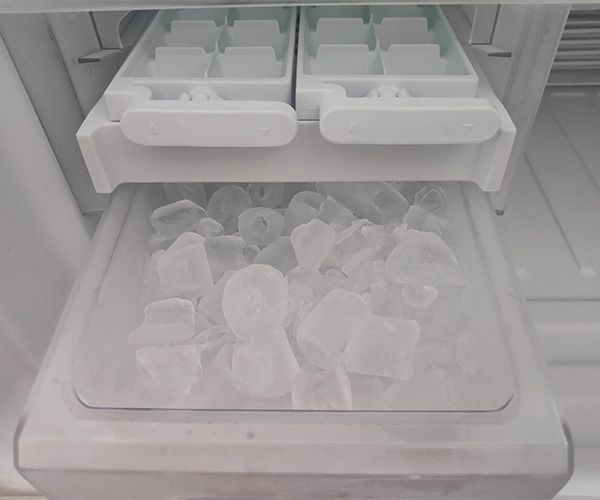
Common Reasons
A crucial component often overlooked in the maintenance of ice machines is the water filter. The role of a filter is paramount, especially when troubleshooting issues like an ice machine running but not making ice. Below, we delve into how a filter can impact your ice machine’s functionality and what you might encounter if it’s neglected:
- Prevention of Scale Build-up:
- Water used in ice machines often contains minerals that can create scale deposits inside the machine. A well-maintained filter removes these minerals, preventing scale build-up which can clog water lines and disrupt the ice-making process.
- Key Point: Regular filter replacement ensures the water system remains clean, enhancing the machine’s performance and longevity.
- Ensures Consistent Ice Quality:
- The filter purifies water by removing impurities and odors, which are crucial for maintaining the taste and clarity of the ice. Without a clean filter, the ice may come out cloudy or with an unpleasant taste, reflecting poor water quality.
- Key Point: A functioning filter is essential for producing high-quality ice that is free from contaminants.
- Protection Against Malfunctions:
- When filters are clogged or overly dirty, they restrict water flow to the ice maker, which can be a primary reason for an ice machine to be running but not making ice. This lack of water flow means the ice machine operates loudly, trying to function without adequate water supply.
- Key Point: Regular monitoring and changing of the ice machine filter can prevent unexpected breakdowns and noisy operation.
- Efficiency and Energy Savings:
- A clean filter allows the ice machine to operate more efficiently by ensuring that the system isn’t working harder than necessary. This efficiency translates into energy savings and a reduction in wear and tear on the machine’s components.
- Key Point: Efficient operation with a clean filter can significantly extend the life of the ice machine.
- Impact on Warranty and Service Calls:
- Many manufacturers’ warranties require regular maintenance, including filter changes, to remain valid. Ignoring this maintenance can lead to voided warranties and increased costs from service calls.
- Key Point: Keeping up with filter changes is a small task that holds significant financial benefits regarding warranty and repair costs.
Understanding the critical role that a filter plays in the performance of an ice machine not only helps in maintaining the unit but also ensures it operates at peak efficiency. Regular replacement and maintenance of the filter can solve and prevent common issues, such as when your ice machine is running but not making ice, thereby saving you time, money, and ensuring a continuous supply of good quality ice. https://amzn.to/3WoePQf
Troubleshooting Guide
When your ice machine is running but not making ice, the situation can be as frustrating as it is perplexing. Here’s a step-by-step troubleshooting guide to help you identify and resolve the issue:
- Listen for Unusual Noises: Start by listening to the sound your ice machine makes. Is there a clicking, buzzing, or grinding noise? Each sound could indicate a different problem, from a faulty fan motor to a dying compressor.
- Inspect the Water Supply:
- Ensure that the water supply line is fully open and not kinked, which could restrict the flow of water.
- Check the water filter; a clogged filter can block water flow to the ice maker.
- Verify that the water pressure is high enough to supply the ice machine effectively.
- Check the Freezer Temperature:
- The freezer temperature should be set between 0°F and 5°F. If it’s too high, the machine won’t produce ice.
- Use a thermometer to confirm the internal temperature.
- Examine the Ice Making Mechanism:
- Look at the ice mold in the ice maker. If there’s frozen water in it but it’s not ejecting ice, the heating mechanism used to loosen the ice could be malfunctioning.
- Ensure that the ejector arms or paddles are not blocked with ice and can move freely.
- Evaluate the Control Arm:
- The control arm should be down. If it is up, it will halt ice production. This can sometimes happen by accident.
- Reset the Electrical Connections:
- Unplug the ice machine for about 30 seconds, then plug it back in to reset the electronics. Sometimes, a reset can fix a minor glitch in the system.
- Check for any loose wires or signs of corrosion on the electrical connections.
- Clean the Ice Machine:
- Regular cleaning can prevent issues. Calcium build-up can interfere with machine function.
- Use an appropriate ice machine cleaner and follow the manufacturer’s instructions for cleaning.
By gaining an understanding of and adhering to these methods, you will be able to determine the reason why your ice maker is operating but not producing ice. The purpose of this tutorial is to provide you with the knowledge and skills necessary to address common issues before contacting a professional, which could save you both time and money. In the event that you are unsure of the solution or the issue continues, it is advisable to seek the advice of a technician.
Maintenance Tips to Prevent Future Issues
Maintaining your ice machine properly not only ensures a consistent supply of ice but also extends the lifespan of your appliance. Regular upkeep can prevent the common issue where your countertop ice maker won’t make ice. Here are some detailed steps to help you keep your ice machine in optimal condition:
- Regular Cleaning and Inspection:
- Clean the ice making area monthly: Ensure that the area where the ice is made is free from mineral buildup and mold, which can hinder ice production.
- Inspect for leaks and rust: Check hoses and connectors for any signs of leakage or corrosion, which can affect the efficiency of your machine.
- Optimal Operating Environment:
- Maintain proper ventilation: Ice machines need good airflow to operate efficiently. Make sure your unit isn’t tucked away in a tight spot.
- Keep ambient temperatures stable: Extreme temperatures can affect the performance of your ice machine. Try to keep the environment around your ice machine at a consistent temperature.
- Water Filtration System:
- Install a water filter: Using filtered water can reduce the mineral deposits that might block your machine’s system.
- Change the filter as recommended: Regularly replacing the water filter according to the manufacturer’s guidelines can prevent problems related to water quality.
- Scheduled Professional Maintenance:
- Annual service by a professional: Even if no problems are apparent, having a professional technician service your ice machine can help catch issues before they lead to a breakdown.
- Best Practices for Usage:
- Do not overload the machine: Avoid putting more demand on your ice machine than it is designed to handle.
- Turn off when not in use: If you know you won’t need ice for an extended period, consider turning the machine off to prevent wear and tear.
By following these maintenance tips, you can significantly reduce the chances of facing the issue where your countertop ice maker won’t make ice. Consistent care and preventive measures will ensure your ice machine remains reliable and efficient for years to come.

DIY Fixes vs. When to Call a Professional
When your countertop ice maker won’t make ice, it’s crucial to know which problems you can tackle yourself and when it’s time to call in the experts. Here’s a guide to help you decide:
- Simple DIY Fixes:
- Check the water supply: Ensure that your ice maker is getting a sufficient water flow. A clogged water filter or supply line can often be the culprit.
- Inspect the freezer temperature: If the freezer is not cold enough, your ice maker won’t produce ice. The temperature should be set between 0°F and 5°F.
- Reset the ice maker: Sometimes, simply resetting your appliance can solve the problem. Look for a reset button or unplug the machine for a few minutes before plugging it back in.
- When to Call a Professional:
- Mechanical failures: If you suspect a mechanical issue, such as a broken motor or malfunctioning compressor, professional repair is necessary.
- Electrical issues: Faulty wiring or problems with the electronic controls should be handled by a certified technician to avoid further damage or safety hazards.
- Frequent breakdowns: If your ice maker frequently stops working despite regular maintenance, it might be time for a professional diagnosis to determine if a replacement is more cost-effective.
In understanding when to apply these fixes or seek professional help, you ensure not only the longevity of your appliance but also your safety. If you’re unsure about a particular problem, it’s always better to err on the side of caution and consult with a professional. This proactive approach can save you time and money in the long run, keeping your ice maker in optimal condition.
Remember, regular maintenance is key to avoiding these issues in the first place. Keep an eye on the performance of your countertop ice maker and address problems early to prevent them from escalating.
Conclusion: Understanding the balance between DIY fixes and professional repairs is crucial for maintaining your ice maker efficiently. By assessing the situation carefully and acting accordingly, you can ensure reliable operation and long-lasting performance from your device.
Call to Action: If you found these tips helpful, don’t forget to share this article with friends or family who might also benefit from knowing more about their ice machine. Your feedback and experiences are also welcome in the comments below!
FAQs: The Role of a Filter in an Ice Machine’s Performance
- What function does a filter serve in an ice machine?
- A filter in an ice machine primarily removes impurities from the water used to make ice. This ensures that the ice produced is clear, taste-free, and odorless, enhancing the overall quality of the ice.
- How does a filter improve the performance of an ice machine?
- By filtering out minerals and sediments, the filter prevents these particles from building up in the ice machine’s internal components. This reduces wear and tear, leading to better efficiency and a longer lifespan for the machine.
- Can a filter affect the taste of ice?
- Yes, a clean filter ensures that any chlorine, sulfur, or other chemicals commonly found in tap water are removed, which can significantly improve the taste of the ice produced.
- What happens if the ice machine filter is not changed regularly?
- Not changing the ice machine filter regularly can lead to clogs and buildups of impurities, which can impair the machine’s functionality, reduce ice production rate, and degrade ice quality.
- How often should the ice machine filter be replaced?
- It’s generally recommended to replace the ice machine filter every six months, but this can vary based on the manufacturer’s guidelines and the water quality in your area.
- Does using a filter extend the maintenance intervals of an ice machine?
- Yes, using a clean filter can minimize the scale buildup and the amount of cleaning needed, thus extending the periods between each maintenance session.
- Are all ice machine filters the same?
- No, filters vary depending on the model and make of the ice machine. It’s important to use the filter recommended by the manufacturer to ensure optimal performance.
- What should I look for when choosing a filter for my ice machine?
- Look for filters that can remove both large sediments and microscopic particles. Also, consider filters that can handle any specific impurities prevalent in your local water supply.
